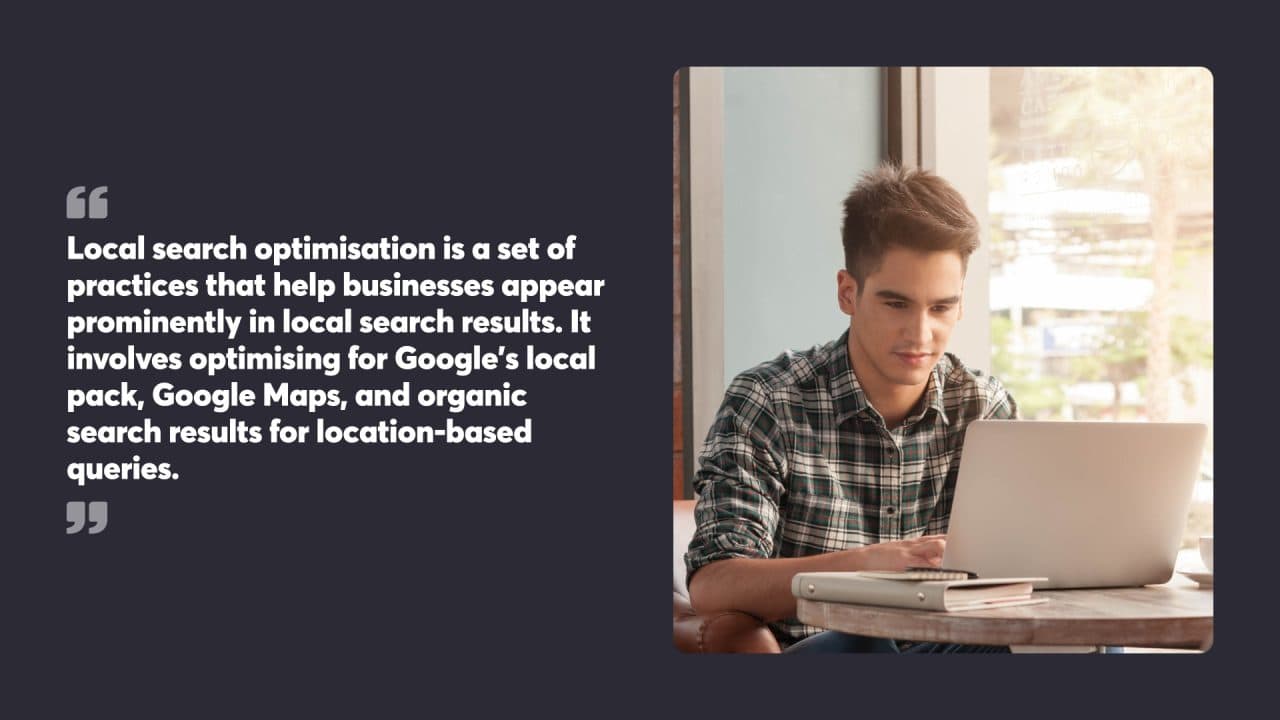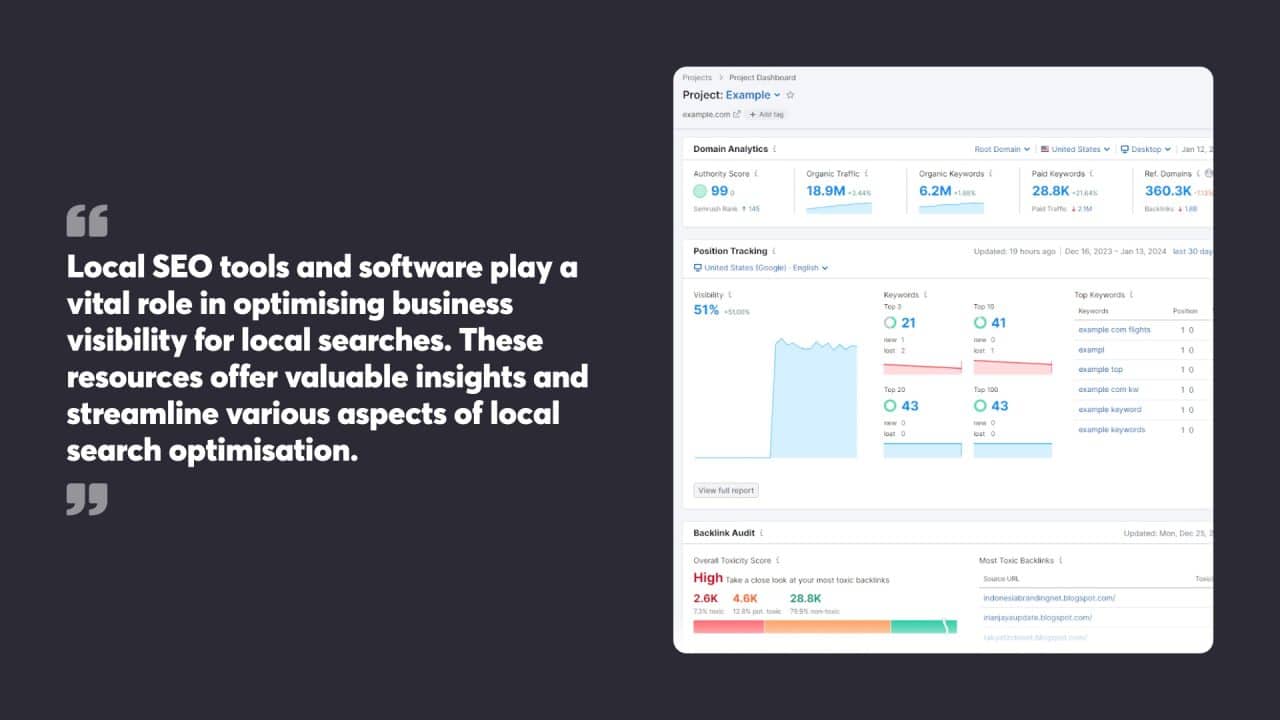
Local SEO is a crucial strategy for businesses aiming to increase their visibility in local search results. It involves optimising online presence to attract customers in specific geographic areas. Local search engine optimisation helps businesses appear in map listings, local pack results, and organic search rankings for location-based queries.
Local search optimisation encompasses various techniques, including setting up and refining a Google Business Profile, creating location-specific content, and building local citations. These efforts help search engines understand a business’s relevance to local searches, improving its chances of appearing in results when nearby customers are looking for products or services.
Effective local SEO can drive foot traffic to physical stores, increase phone calls, and boost website visits from local customers. It’s particularly valuable for small businesses, service providers, and brick-and-mortar shops competing in their local markets.
Key Takeaways
- Optimising your Google Business Profile is crucial for local SEO success. Ensure your profile is complete, accurate, and regularly updated with relevant information, photos, and posts to improve your visibility in local search results and attract more customers.
- Creating local content is essential for boosting your relevance to nearby customers. Incorporate location-specific keywords naturally throughout your website, develop landing pages for each service area, and leverage user-generated content like customer reviews and testimonials to demonstrate your local expertise and build trust with potential clients.
- Building local citations and links is vital for establishing your business’s online presence and credibility. Consistently list your business on reputable online directories, partner with local organisations, and engage in community events to generate high-quality backlinks and strengthen your local search rankings.

Table of Contents
Understand the Basics of Local SEO
Local SEO focuses on optimising a business’s online presence for location-specific searches. It aims to boost visibility in local search results and attract nearby customers. Unlike general search engine optimisation, which targets broader search queries, local SEO involves specific strategies such as optimising content, building local links, and managing online presence.
What Is Local SEO?
Local search optimisation is a set of practices that help businesses appear prominently in local search results. It involves optimising for Google’s local pack, Google Maps, and organic search results for location-based queries. Key elements include:
- Claiming and optimising Google Business Profile listings
- Building local citations and backlinks
- Creating location-specific website content
- Managing online reviews and ratings
Local SEO differs from traditional SEO by targeting geographical areas. It focuses on ranking for searches like “cafes near me” or “plumber in Sydney”.
Why Is Local SEO Important?
Local SEO is crucial for businesses that serve specific areas. It helps them:
- Increase visibility to local customers
- Attract more foot traffic to physical locations
- Compete effectively with other local businesses
- Build trust and credibility in the community
With the rise of mobile searches, local SEO has become even more vital. Many consumers use their smartphones to find nearby businesses, making local search optimisation essential for capturing these potential customers.
Local SEO also improves overall online visibility. By ranking in the local pack and Google Maps, businesses can occupy more space in search results, increasing their chances of being noticed by potential customers.
Understanding Local Search Algorithm
The local search algorithm is a sophisticated system that determines how local businesses rank in search engine results pages (SERPs). It evaluates various factors to ensure that the most relevant and prominent businesses appear at the top of local search results. Understanding these factors is crucial for optimising your online presence and improving your local search rankings.

Setting Up Your Google Business Profile
A Google Business Profile boosts local visibility and helps businesses rank higher in search results. It provides crucial information to potential customers and enhances a company’s online presence.
Claiming and Optimising Your Profile
To set up a Google Business Profile, start by searching for your business name on Google. If it doesn’t exist, create a new listing. Fill in all essential details like name, address, phone number, and business category. Add high-quality photos of your premises, products, or services. Keep your operating hours up to date and accurate.
Include a clear, concise business description that highlights your unique selling points. Use relevant keywords naturally within this text. Regularly post updates, offers, or events to keep your profile active and engaging. Respond promptly to customer reviews, both positive and negative, to show you value feedback.
The Impact on Local Search Rankings
A well-optimised Google Business Profile significantly improves local search rankings. It helps businesses appear in the local pack—the top three listings shown for location-based searches. This increased visibility often leads to more website visits, phone calls, and foot traffic.
Google uses the information in your profile to determine relevance for local searches. Accurate and complete data increases your chances of appearing in results for queries related to your products or services. Customer reviews and ratings also play a key role in local rankings, with higher-rated businesses often given preference.
Regular updates and posts signal to Google that your business is active, which can positively affect your ranking. By maintaining an optimised profile, you create a strong foundation for local SEO success.
Key Ranking Factors for Local SEO
Local search rankings depend on several crucial elements. These factors directly impact a business’s visibility in local search results and can significantly influence customer acquisition.
Understanding Local SEO Ranking Factors
Local SEO ranking factors differ from traditional SEO. Google considers proximity, relevance, and prominence when determining local search rankings. Proximity refers to the distance between the searcher and the business. Relevance measures how well a business matches the search query. Prominence assesses a business’s reputation and online presence.
Google Business Profile optimisation plays a vital role in local SEO. A complete and accurate profile increases the chances of appearing in the local pack. Reviews also carry substantial weight, with both quantity and quality influencing rankings. On-page SEO elements, such as local keywords and location-specific content, contribute to improved visibility.
Relevance of Accurate Business Information
Consistent and correct business information across the web is critical for local SEO success. This includes the business name, address, and phone number (NAP). Search engines use this data to verify a business’s legitimacy and location.
NAP consistency across online directories, social media profiles, and the business website helps build trust with search engines. It’s essential to keep this information up-to-date and uniform. Local citations from reputable sources further strengthen a business’s online presence and can boost local search rankings.
Links from local websites and organisations also play a part in establishing local authority. These connections signal to search engines that a business is an active part of the community. Obtaining citations from local sites is a key strategy in local link building, enhancing visibility and search rankings for region-focused businesses.
Keyword Research for Local Businesses
Keyword research is a foundational element of local SEO. It involves identifying the specific terms and phrases that potential customers use when searching for local businesses like yours. By targeting these keywords, you can improve your local search rankings and draw more customers to your business.
Finding Relevant Keywords
To discover the most relevant keywords for your local business, you can utilise tools such as Google Keyword Planner, SEMrush, or Ahrefs. These tools provide insights into the search volume and competitiveness of various keywords, helping you identify the best terms to target.
Here are some tips for finding relevant keywords:
- Use Location-Based Keywords: Incorporate keywords that specify your location, such as “New York City” or “Los Angeles.” For example, a bakery in New York City might target keywords like “best bakery in NYC” or “New York City cupcakes.”
- Use Industry-Specific Keywords: Include keywords that are specific to your industry. For instance, a plumbing business might use terms like “emergency plumber” or “plumbing repair.”
- Use Long-Tail Keywords: Long-tail keywords are longer, more specific phrases that often have lower competition. Examples include “affordable wedding photographer in Los Angeles” or “24-hour emergency plumber in Chicago.”
By strategically targeting these keywords, you can enhance your local search rankings and attract more customers who are actively looking for your products or services.

On-Page SEO Strategies for Local Search
On-page optimisation is crucial for improving local search visibility. Effective content and metadata techniques can significantly boost a website’s relevance for location-specific queries.
Content Optimisation
Local keyword research forms the foundation of content optimisation. Identify search terms that combine business offerings with location names. Incorporate these keywords naturally throughout web pages, focusing on headings, subheadings, and opening paragraphs.
Create location-specific landing pages for each service area. Include local landmarks, events, and community information to demonstrate geographical relevance. Use schema markup to highlight business details like address, phone number, and operating hours.
Customer reviews and testimonials add authenticity and localised content. Encourage satisfied clients to leave reviews mentioning specific locations or services.
Title Tags and Meta Descriptions
Craft compelling title tags that include the primary local keyword and business name. Keep titles under 60 characters to avoid truncation in search results. For example: “Best Plumber in Brisbane | Quick Fix Plumbing Services”
Meta descriptions should summarise the page content and include a call to action. Incorporate location and service keywords naturally. Aim for 150-160 characters to maximise visibility in search snippets. Example: “Need a reliable plumber in Brisbane? Quick Fix Plumbing offers 24/7 emergency services. Call now for fast, affordable repairs across the Sydney metro area.”

Building Local Links and Citations
Local links and citations play a crucial role in boosting a business’s visibility in local search results. They help search engines verify the legitimacy and relevance of a business within its local area.
The Power of Local Citations
Local citations are online mentions of a business’s name, address, and phone number (NAP). These listings appear on various platforms, including business directories, social media profiles, and review sites. Consistent and accurate citations across the web strengthen a business’s local SEO.
To maximise the impact of local citations, businesses should:
- Claim and optimise their Google Business Profile
- List their business on popular directories like Yelp and Yellow Pages
- Maintain uniform NAP information across all platforms
- Encourage customers to leave reviews on citation sites
Effective Local Link Building Techniques
Local link building involves acquiring high-quality backlinks from reputable websites within the same geographic area or industry. These links signal to search engines that a business is trusted and relevant to local searches.
Some effective local link building strategies include:
- Partnering with local charities or sponsoring community events
- Creating valuable content that local news outlets or bloggers might link to
- Joining local business associations and chambers of commerce
- Engaging in local networking events and building relationships with other businesses
By focusing on building quality local links and citations, businesses can improve their chances of ranking higher in local search results and attracting more customers from their target area.
Local SEO Content Creation
Local SEO content creation focuses on producing materials that appeal to nearby audiences and boost visibility in local search results. This approach involves crafting locally relevant content and leveraging community events to connect with the target market.
Creating Content That Resonates Locally
Local SEO strategies should prioritise content that speaks directly to the community. Businesses can start by researching local keywords and incorporating them naturally into website copy, blog posts, and service pages. It’s valuable to address local issues, highlight regional landmarks, or discuss area-specific topics that interest the target audience.
Creating location-specific landing pages for each service area can improve local search rankings. These pages should include relevant local information, such as nearby attractions or neighbourhood characteristics. User-generated content, like customer reviews and testimonials from local clients, adds authenticity and helps build trust with potential customers.
Utilising Local Events and News
Incorporating local events and news into content strategies can significantly boost local SEO efforts. Businesses should keep an eye on community calendars and local newspapers for upcoming events or noteworthy happenings. Writing blog posts or creating social media content about these events shows active community involvement and can attract local interest.
Sponsoring or participating in local events provides opportunities for content creation and backlinks from event websites or local news outlets. Businesses can also create content around seasonal topics relevant to their locality, such as winter preparedness tips for colder regions or summer activity guides for tourist destinations.
Mobile Search Optimisation Techniques
Mobile search has become a critical component of local SEO strategies. Businesses must adapt their approaches to cater to users searching on smartphones and tablets.
Importance of Mobile in Local SEO
Mobile devices have transformed how people search for local businesses and services. Over 60% of local searches are now performed on mobile devices. These searches often lead to quick actions, with many users visiting a store or making a purchase within hours.
Google prioritises mobile-friendly websites in its search results, especially for local queries. This means businesses with mobile-optimised sites are more likely to appear in the coveted “local pack” of top results.
Mobile searches are frequently location-based, with users seeking nearby options. Google uses a device’s GPS data to deliver relevant local results, making mobile optimisation crucial for businesses targeting local customers.
Optimising for Mobile Search
To improve mobile search performance, websites must be responsive and load quickly on all devices. This includes optimising images, minimising code, and using mobile-friendly layouts.
Local businesses should claim and optimise their Google Business Profile, as it appears prominently in mobile search results. Keep contact details, hours, and photos up-to-date.
Incorporate location-based keywords naturally throughout your website content. Focus on terms people use when searching for local businesses on mobile devices.
Make it easy for mobile users to take action. Include click-to-call buttons, maps with directions, and prominent contact forms. Consider adding schema markup to help search engines understand your business details.

Website Speed and Core Web Vitals
Website speed and Core Web Vitals are critical components of local SEO. A fast-loading website improves user experience while also positively impacting your local search rankings. Google considers website performance as a ranking factor, making it essential for businesses to optimise their site speed.
Improving Website Performance
To enhance your website’s performance, you can use tools like Google PageSpeed Insights or GTmetrix. These tools analyse your website and provide actionable recommendations for optimisation.
Here are some tips for improving website performance:
- Optimise Images: Compress images to reduce their file size without compromising quality. This can significantly improve page load times.
- Minify Code: Minify HTML, CSS, and JavaScript code to remove unnecessary characters and reduce file size. This helps in speeding up the website.
- Use Caching: Implement caching to store frequently used resources, reducing the time it takes to load pages for returning visitors.
- Use a Content Delivery Network (CDN): A CDN distributes your website’s content across multiple servers worldwide, ensuring faster load times for users regardless of their location.
By focusing on these optimisation techniques, you can improve your website’s speed, enhance user experience, and boost your local search rankings. A fast, responsive website is more likely to engage visitors and convert them into customers, making it a crucial aspect of your local SEO strategy.

Utilising Reviews and Online Reputation Management
Reviews play a crucial role in local SEO, influencing search rankings and consumer decisions. Managing your online reputation through reviews can significantly impact your business’s visibility and credibility.
Encouraging Positive Reviews
Businesses should actively seek feedback from satisfied customers. After a positive interaction, politely ask clients to share their experience online. Make the review process simple by providing direct links to your Google Business Profile or other review platforms. Train staff to request reviews at appropriate times, such as after a successful purchase or service completion.
Create a follow-up system to remind customers to leave reviews a few days after their visit. This can be done through email or text messages, depending on the customer’s preference. Offer incentives for reviews, but be careful not to violate platform policies or offer rewards for positive reviews only.
Managing Negative Reviews
Respond promptly and professionally to all negative reviews. Address the customer’s concerns directly and offer solutions or compensation where appropriate. This shows potential customers that you value feedback and are committed to improving.
Use negative reviews as an opportunity to showcase your customer service skills. Apologise for any shortcomings and explain steps taken to prevent similar issues in the future. If possible, take the conversation offline to resolve the problem privately.
Consider implementing a review monitoring system to stay on top of new feedback across various platforms. This allows for quick responses and helps identify recurring issues that may need addressing in your business operations.
Advanced Local SEO Tactics
Local businesses can gain a competitive edge by implementing sophisticated SEO strategies. These tactics go beyond basic optimisation to boost visibility and attract more local customers.
Leveraging Schema Markup for Local Business
Schema markup helps search engines understand website content more effectively. Local businesses can use specific schema types to highlight important information. This includes business name, address, phone number, opening hours, and customer reviews.
Implementing schema markup can lead to rich snippets in search results. These enhanced listings stand out and provide users with key details at a glance. For example, star ratings and price ranges may appear directly in search results.
Local businesses should focus on ‘LocalBusiness’ schema and its subtypes. These schemas can specify service areas, accepted payment methods, and even menu items for restaurants.
Analysing Competitor SEO Strategies
Studying competitors’ SEO tactics can reveal valuable insights and opportunities. Start by identifying top-ranking local businesses in your industry. Examine their websites, content, and backlink profiles to spot successful strategies.
Tools like SEMrush or Ahrefs can uncover competitors’ keyword targets and content gaps. This information helps shape your own keyword strategy and content plan. Pay attention to the types of content that perform well for competitors, such as blog posts, videos, or local guides.
Analyse competitors’ Google Business Profiles for optimisation ideas. Look at their business descriptions, categories, attributes, and photo content. This can guide improvements to your own profile and help you stand out in local pack results.
Review competitors’ local citations and backlink sources. This can highlight valuable directories or local partnerships to pursue. Building similar high-quality links can boost your local search rankings.

Effective Use of Local SEO Tools and Software
Local SEO tools and software play a vital role in optimising business visibility for local searches. These resources offer valuable insights and streamline various aspects of local search optimisation.
Assessing the Best SEO Tools
When choosing local SEO tools, businesses should focus on those that offer comprehensive features for managing Google Business Profiles, tracking local rankings, and analysing competitor data. Top-rated options include BrightLocal, Moz Local, and Semrush’s local SEO toolkit. These platforms provide functionalities like citation management, review monitoring, and local keyword research.
It’s crucial to select tools that align with specific business needs and budget constraints. Some tools excel in automated reporting, while others offer advanced features for multi-location businesses. Trialling different options can help determine which tools best suit a company’s local SEO strategy.
Tracking and Measuring Success
Effective local SEO tools provide detailed analytics to track campaign performance and measure success. Key metrics to monitor include local search rankings, website traffic from local searches, and conversion rates for location-specific landing pages.
Google Analytics and Google Search Console are essential free tools for tracking website performance and search visibility. Paid tools often offer more detailed insights, such as competitor analysis and local pack tracking.
Regular reporting and analysis help businesses identify areas for improvement and adjust strategies accordingly. By consistently monitoring these metrics, companies can refine their local SEO efforts and boost their visibility in local search results.

Local SEO for Different Types of Businesses
Local SEO strategies vary depending on the nature of the business. Service-based companies and brick-and-mortar shops face distinct challenges in optimising their local search presence.
Approaching SEO for Service-Based Businesses
Service-based businesses need to focus on building a strong online reputation. They should encourage satisfied customers to leave positive reviews on Google Business Profile and other relevant platforms. Creating location-specific service pages can boost visibility for targeted areas.
Implementing Local Business Schema markup on the website helps search engines understand the business type and service areas. This can improve visibility in local search results.
Content marketing plays a key role. Publishing blog posts about local events or area-specific topics can attract local searchers. Service providers should also list their business in relevant online directories to build citations and improve local rankings.
Strategies for Brick and Mortar Locations
Physical shops must prioritise their Google Business Profile. Regular updates with photos, posts, and accurate business hours are essential. They should also respond promptly to customer reviews and questions.
In-store events or promotions can be promoted through the Google Business Profile to drive foot traffic. Brick-and-mortar stores should create location pages on their website for each physical outlet, optimising them with local keywords and NAP (Name, Address, Phone) information.
Local link building is valuable. Partnering with other local businesses or sponsoring community events can generate quality backlinks. Stores can also leverage location-based keywords in their content and meta tags to improve relevance for nearby searches.
To get your local search results up to speed, contact the team at Chillybin today.




